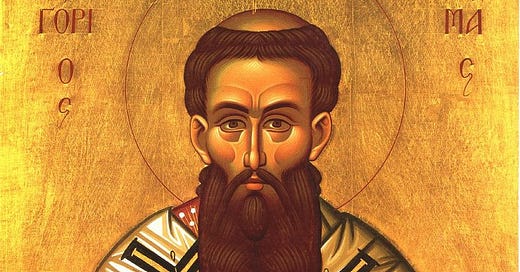I’ve been going down a bit of a rabbit hole in Palamas research recently (and hope to have a more substantive related post in the near future), and it got me thinking about the debate about how best to translate the ‘energeiai’ half of what has traditionally been called the essence-energies distinction.
In more recent years, the translation of “energy” has seemingly gone out of favor, with a preference given to “activity.” In a recent translation of St. Gregory’s On Participation, Kristen Anderson explicitly and uniformly chooses ‘activity’ over ‘energy’ and points to critical studies by Teodor Tollefsen and Eric Perl as well as a recent translation by Rein Ferwerda of the Dialogue with a Barlaamite that do the same. She helpfully states the two main reasons that tend to be given to support this choice.
The first is to emphasize the fact that the word, and Palamas’ use of it, has a philosophical and patristic history that is relevant to understanding it, and where it is usually rendered as ‘activity’ in English language discussions and translations. Translating it that way in Palamas’ writings preserves the historical continuity.
The second has to do with worries about misunderstandings that can be introduced by the word ‘energy.’ As Anderson puts it when explaining her choice, “I believe that the English term ‘energy’ unnecessarily reifies the concept, inviting the misinterpretation of ἐνέργεια as some thing mysteriously flowing from God, and distinct from him.” Tollefsen similarly worries about an impression of ‘a kind of quasi-material force almost flowing into the human recipient.’ When discussing the essence/energies distinction in non-scholarly contexts, I am often presented with a variation of this second worry, which sees talk of “energy” as too likely to be interpreted as some New Age Force or something.
These arguments have some persuasiveness, but I am not fully convinced. The main problem is that “activity” seems to me far more misleading, or at least misleading in a more problematic way. We too easily think we know what “activity” means in a way that may make us completely miss out on what is most distinctive of Palamas’ picture. The whole point of the essence/energies distinction is to secure real ontological participation in God in a way that preserves God’s uniqueness and transcendence. But what does it mean to have ontological participation in an activity? What does it mean for God’s activity to be God himself? What does it mean for being itself to be an activity we participate in? What does it mean for God’s activity, in which God is fully present, to be perceptible as a type of uncreated glory or light? Our ordinary understanding of ‘activity’ is no help here. The word ‘energy’, while still mysterious and liable to mislead if taken too far, at least seems vaguely suggestive of the sorts of things most important to capture for St. Gregory’s particular use of energeia.
And as for the worries about reification, it seems to me there is a middle ground here that must be lightly tread. Although the energies are not distinct concrete entities independent of God, it seems to me we don’t fully understand the Palamite distinction unless they seem dangerously close to such. This is because in the Neo-Platonic underpinnings of the distinction, they clearly serve an intermediary function between the undivided and imparticipable essence and the multiplicity of creation. That is, they serve more or less the same function as the first multiplicity/Intellect in Plotinus or the henads in Proclus. The main difference is the denial that they are self-subsistent in any way, distinct gods, or ontologically inferior to the One. They are the One in his self-disclosure ad extra. In the divine energies, Palamas, says, “This One God, worshipped in three hypostases and a single essence, is also divided indivisibly and without division in different energies. ‘For God is said to be multiplied,’ according to the divine Maximos, ‘in his individual counsel for the production of beings, becoming pluriform in his providential processions.’” Palamas did apparently refer to the energies at times as “lesser divinities,” and this is part of what made Akindynos change his mind about the acceptability of the distinction. While we need to be careful not to take this way of talking too literally and lose what distinguishes Palamas’ view from those of the pagan Neo-Platonists, we also cannot let a fear of reification let us overlook his distinctiveness in the opposite way and overlook what they share.





Participating in an ‘energy’ seems to be a passive affair, like sitting on a beach getting tanned by the sun. Participating in an ‘activity’ is well, active. One has to be doing the works of God to participating in the being of God.
Excellent essay.
Some thoughts.
1. Another possibility is to translate ενέργεια as “actuality” is some places.
2. Aristotle distinguishes ενέργεια (actuality) from δυνάμεις (potentiality)in the Metaphysics, and Proclus noticeably uses the same distinction between act and potential in his Elements of Theology. Does that distinction make its way into Patristic texts? No one seems to talk about this.
3. The distinction between ουσία and ενέργεια is found in Proclus’ Elements of Theology. William of Moerbeke rendered ενέργεια as ‘operatio’. That might not be a bad choice for English, too. To translate ενέργεια as ‘operation’.